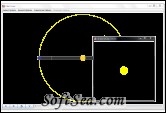|
Phases of Venus Model 
|
Simulate the Venus phases with this tool. Venus Phases model shows the shadows cast by two gnomons at different locations on Earth. For one gnomon the sun is directly overhead (as would be the case if the gnomon was on the Tropic of Cancer at the summer solstice). The other gnomon is due north of the first gnomon. The sizes of the gnomons are greatly exaggerated for visibility. This simulation can be used to help illustrate how Eratosthenes was able to measure the diameter of Earth using the shadows cast by two gnomons, one situated due north of the other, on a day when the southerly gnomon cast no shadow at all. The distance between the two gnomons (along Earth's surface) can be adjusted. The length of the shadow is given, and this length can be used to determine the angle between the gnomon lines and from that the circumference (and diameter, radius, etc) of Earth. The Earth can be hidden to give a better view of the relevant geometry.
EJS Phases of Venus model was created using the Easy Java Simulations (Ejs) modeling tool. It is distributed as a ready-to-run (compiled) Java archive. Double clicking the ejs_astronomy_VenusPhases.jar file will run the program if Java is installed. Ejs is a part of the Open Source Physics Project and is designed to make it easier to access, modify, and generate computer models. Additional Ejs models for astronomy are available. They can be found by searching ComPADRE for Open Source Physics, OSP, or Ejs.
Eratosthenes Measures Earth
Display Options Menu
1. Show Earth: show a disk representing Earth. Deselect this option to get a better view of the geometry.
2. Show Length of Shadow: display a panel at the bottom of the window that gives the length of the moveable gnomon's shadow.
3. Show Angle Between Gnomons: display a panel at the bottom of the window that gives the angle between the two gnomon lines. This can be used to help students who are unfamiliar with trigonometry (specifically the inverse tangent function that is needed to compute this angle from the length of the shadow).
4. Show Sunbeams: show lines representing rays of sunlight that graze the tops of the gnomons.
5. Show Center of Earth: show a dot at the center of Earth.
Visual Elements
Blue disk: Earth.
1. Red lines: the two gnomons. If you hide Earth the gnomon lines extend down to Earth's center.
2. Yellow arrows: light rays from Sun. These lines are effectively parallel to each other (although strictly speaking they are not exactly parallel) because Sun is on the order of 10,000 Earth diameters from Earth.
3. Magenta line: shadow cast by the moveable gnomon (the fixed gnomon does not cast a shadow since Sun is assumed to be directly overhead for that gnomon).
4. Green dot: the center of Earth.
Controls, etc.
1. Distance: the distance (in km) along Earth's surface between the two gnomons.
2. The length of the moveable gnomon's shadow is given (in units of the gnomon's length).
3. The angle between the two gnomon lines is given (in degrees).
Requirements:
* Java
The license of this software is Freeware, you can free download and free use this graphing software.
